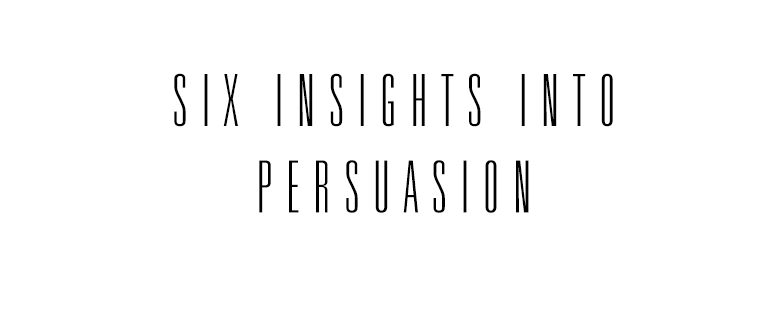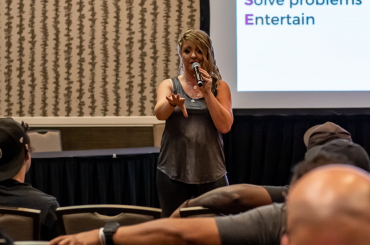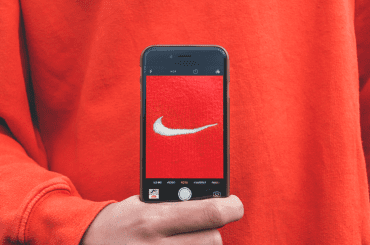Whether we know it or not, we are all in a perpetual state of being influenced. As a DJ-business owner, it can help to be aware of these principles. That’s what’s behind Robert Cialdini’s book, Influence: The Psychology of Persuasion, released in 1984, but generally recognized as a timeless tome on the field of influence and persuasion.
Cialdini, a researcher and professor of psychology, breaks influence and persuasion down into six principles:
Principle 1: Reciprocity
The tendency to return social favors is a near-universal attribute of the human condition. It’s the essence of the Golden Rule: We generally aim to treat others as they treat us. This idea of reciprocity, which can lead us feeling obligated to offer concessions or discounts to others if they have offered them to us, is rooted in the fact that we’re uncomfortable with feeling indebted.
One example of reciprocity that Cialdini cites is the Hare Krishna movement in the 1970s: They were woefully underfunded and unrecognized until they embarked on a campaign where they gave out flowers to passersby for free. Recipients felt the need to donate and the Krishna coffers ballooned—as did their visibility.
How to Use It:
Identify your goals: Do you want to generate more referrals from vendors and catering execs? You then need to identify what you can offer them to obligate a return favor.
The easiest way to do this is on social media: you should be Facebook friends or following all your fellow vendors and execs on Twitter. Re-tweet them or Like something they posted on Facebook to stay top of mind.
Better yet, use an asset of theirs—a photo that a photographer took at a wedding (doesn’t need to be one that you did, by the way) and post that.
Another way is simply going to a bridal fair that you’re exhibiting at and asking at set-up if any other exhibiting vendors need a coffee. Tell them you’re making a run and would be glad to do it.
Principle 2: Commitment (and Consistency)
Cialdini says that we have a deep desire to be consistent, that once we’ve committed to something, we’re more inclined to follow through with it.
How to Use It:
Here, try to get people’s commitment early on, either verbally or in writing. Do this with an “upfront contract”—essentially a verbal agreement at the first meeting with a prospect that details what everybody’s expectations are for what happens when the meeting is over. It puts a clear agenda on the map and assures that your meeting will be purposeful.
Or, if you’re selling a product, sell a small quantity, a “taster.” (Here, the act of purchase is the early commitment.)
Principle 3: Social Proof
This principle relies on our tribal sense of “safety in numbers.”
For example, we’re more likely to work late if our colleagues are, place a tip in a jar if it already contains money, or go to a nightclub with a long line outside. The assumption we’re making is that if many others are doing something, then it must be OK.
We’re more likely to be influenced if the people we see seem to be similar to us. That’s why TV commercials often use moms, not celebrities, to advertise household products, and that’s why your website should have pictures of real brides—not stock images.
How to Use It:
The easiest way to establish social proof is to demonstrate how “buzzworthy” your company is: Highlight on your website how many clients your DJ company has served. Load it up with plenty of testimonials, encourage comments on social media, and publish case studies with current customers to demonstrate your success.
Priciple 4: Liking
Cialdini says that we’re more likely to be influenced by people we like. Likability comes in many forms—people might be similar or familiar to us, they might give us compliments, or we may just simply trust them.
Put simply, people are more likely to buy from people like themselves, from friends, and from people they know and respect.
How to Use It:
This can be achieved when you sponsor, say, a local softball team, or perform at charity events. It helps you interact with the community in an organic, non-forced way—a key to not looking like a phony!
Principle 5: Authority
Most of us feel a sense of obligation to people in positions of authority. This is why ad agencies for pharma companies use doctors in their campaigns.
Job titles, uniforms, and even accessories like cars or gadgets can lend an air of authority, and can persuade us to accept what these people say.
How to Use It:
Here you can use both your own authority, and the authority of others, as influencers.
To ramp up your own authority, make a presentation at a DJ event. Otherwise, on your website, highlight well-known and respected customers, use comments from industry experts, and discuss relevant research about brides and the wedding industry.
Also, make sure your brochures and materials are well-produced.
Principle 6: Scarcity
Cialdini states that products or services are more attractive when their availability is limited, or when we risk losing the opportunity to buy them on favorable terms.
How to use it:
With this principle, people need to know that they’re missing out if they don’t act quickly.
This is why a “Weekends are booking up now” statement on your website can be effective.
Keep these keys to influence in mind when marketing to your audience, and you might be surprised at the positive results.








